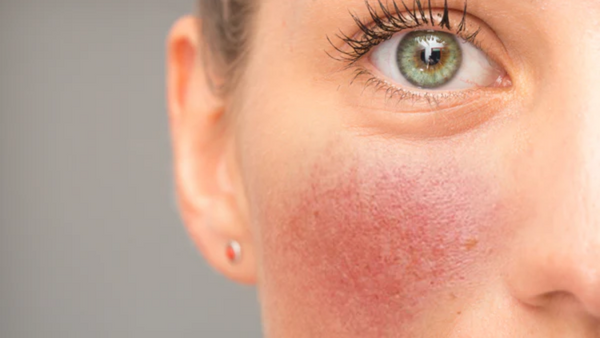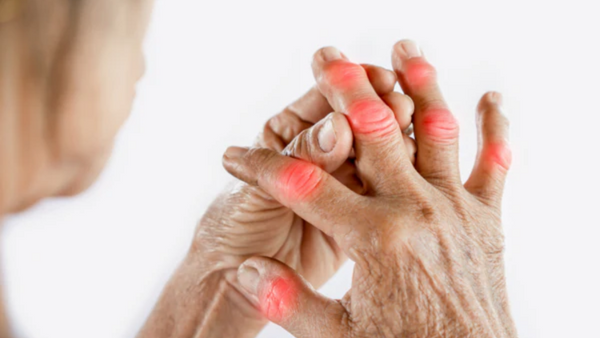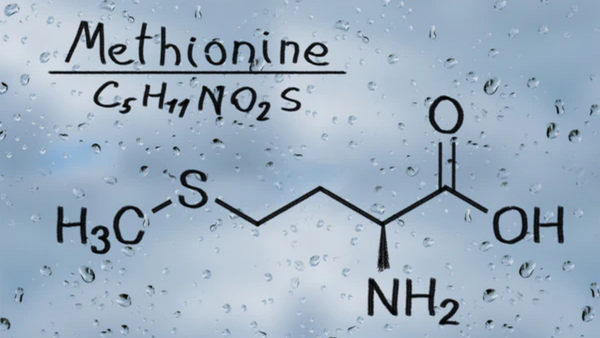Rosacea is an inflammatory skin disease. Veins dilate, causing the skin to appear red. Inflamed areas and red pustules appear.
Rosacea mainly affects the cheeks, chin and nose. However, rosacea can also affect the scalp, chest, neck and even the eyes.
The causes of rosacea are not well understood. However, there appears to be a genetic component, as rosacea tends to run in families.
It is believed that rosacea is caused by a dysregulation of the nerves, immune system and blood vessels. The skin is very easily irritated and factors such as sun, alcohol and stress seem to be able to intensify or trigger rosacea.
The Demodex mite is also suspected of causing rosacea. The mite occurs naturally in the skin and is particularly prevalent in rosacea patients.
Rosacea cannot be cured but is quite treatable. Treatment involves using skin creams with antibiotic and anti-inflammatory ingredients. The active ingredient permethrin works well against mites.
In addition, those affected should avoid triggers such as sun and skin irritants.
Diet also plays a role in rosacea. Patients should avoid spicy foods, alcohol and hot drinks, as these can dilate blood vessels and worsen rosacea. [1] Certain nutrients in the diet can support the treatment of rosacea, while deficiencies can promote it.
Micronutrient therapy can also be useful as an accompanying treatment.
IT'S WORTH READING!
AT THE END OF THE ARTICLE WE HAVE PROVIDED YOU A VOUCHER CODE.

zinc
Zinc has an anti-inflammatory and antioxidant effect and is important for wound healing. [2] A zinc deficiency promotes oxidative stress, which can inhibit wound healing.
Unfortunately, studies on zinc for rosacea have not yet shown clear results. However, it is clear that zinc is essential for skin health and can promote wound healing.
Vitamin C
The body needs vitamin C to produce collagen . Collagen is the most important hormone in connective tissue. In this way, vitamin C strengthens connective tissue and the skin barrier. Vitamin C can also promote wound healing.
Vitamin C is also needed to break down histamine. Histamine promotes inflammation and dilates blood vessels and can therefore contribute to rosacea.
Vitamin also helps protect the skin from oxidative stress. Studies have shown that people with rosacea have increased markers of oxidative stress.

Omega-3 fatty acids
The skin needs fatty acids, including omega-3 fatty acids .
The omega-3 fatty acids EPA and DHA are known for their anti-inflammatory effects. They can relieve itching and dryness in inflammatory skin conditions. [3]
Unfortunately, there are hardly any studies on omega-3 fatty acids for rosacea. However, in one study, EPA and DHA were able to relieve dry eyes in ocular rosacea. [4]
Gamma-linolenic acid
Gamma-linolenic acid is an omega-6 fatty acid. Omega-6 fatty acids are usually pro-inflammatory, but gamma-linolenic acid is an exception. It has an anti-inflammatory effect and also strengthens the skin barrier. [5]
The body can produce gamma-linolenic acid from linoleic acid. However, in some people this process does not work so well. A lack of omega-6 fatty acids in the skin can promote inflammation and neurodermatitis.
Although gamma-linolenic acid has not yet been studied in rosacea patients, the fatty acid can improve itching, skin redness and skin crusting.
B vitamins
B vitamins are needed for many metabolic processes and of course also for metabolic processes in the skin. B vitamins alone have not yet been studied in rosacea, but a study with vitamin B3, folic acid (vitamin B9), zinc and copper showed promising results.

Conclusion: Anti-inflammatory nutrients can support treatment
Anti-inflammatory nutrients such as omega-3 fatty acids, gamma-linolenic acid and zinc appear to have a positive effect on rosacea. B vitamins can also probably have a supportive effect, as they are important for skin metabolism.
WE HAVE GOT YOU A 10 % VOUCHER FOR OUR
Vitamin C , Vitamin B Complex , Vitamin B12 , Omega-3 , Zinc & Copper , Zinc
PROVIDED AND HOPE TO BRING YOU JOY WITH IT.
ROSA+V10
To the products
[1] https://pubmed.ncbi.nlm.nih.gov/29214107/
[2] https://www.ncbi.nlm.nih.gov/pmc/articles/PMC5793244/
[3] https://pubmed.ncbi.nlm.nih.gov/18241260/

















